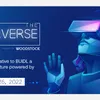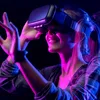The metaverse can make learning more experiential, vivid, and impactful, says Shankar Maruwada, EkStep Foundation
In this third preview article on CII’s upcoming Global Knowledge Summit, we share expert insights on metaverse contributions to education.
Shankar Maruwada is Co-founder and CEO of Foundation, which is building a learning platform to improve applied literacy and numeracy for millions of children in India.
The foundation has developed an open-source digital infrastructure for learning called Sunbird, with a set of modular building blocks for learning at scale. The developed code is open source and available on Github.
Shankar was earlier the Co-founder and CEO of FourthLion Technologies; Head - Demand Generation and Marketing at Unique Identification Authority of India (UIDAI); and Co-founder, and Chief Marketing Officer, Marketics. Shankar is an almunus of IIM Ahmedabad and IIT Kharagpur.
He is also speaking at CII’s upcoming annual Global Knowledge Summit. The 17th edition of the summit is being held in a hybrid format in Bengaluru and online on April 12-13, with the theme of Knowledge Management and the Metaverse.
As media partner for the Global Knowledge Summit, see YourStory’s preview article of the 2022 edition here, and coverage of the editions from 2021, 2020 and 2019.
In this chat with YourStory, Shankar talks about education in the metaverse, trends in the ecosystem, and opportunities for India.

Edited excerpts of the interview:
YourStory [YS]: Immersive media and blockchain have been around for a while – what is new about the metaverse concept? How would you demystify the hype and misconceptions around it?
Shankar Maruwada [SM]: We can think of the metaverse as being part of the evolutionary process of the web: from reading to being social to now being experiential. And also towards more decentralisation, more co-creation, and so forth.
So now with the metaverse, you can “create experiences” – magical, imaginary or mirrors of the real world or a certain version of that reality. As the technology becomes more mainstream, hardware costs drop, computing power increases, and there are more adopters, there will be more and more use cases – from small groups of people with unique needs to more widespread usage in diverse areas.
[YS]: In the context of learning and knowledge assets, what contributions does the metaverse make?
[SM]: The metaverse allows us to recreate experiences. Imagine a classroom full of students being able to interact with a virtual human heart. They can ‘teleport’ inside the heart to see the interior of the heart’s chambers and vessels, and watch the circulation of blood throughout the heart.
They can rotate, open and examine its twelve primary parts. Or, let’s say in a cricket training camp, a young girl can stand next to Virat Kohli and study how he places a shot.
Learning happens with both seeing and doing. They say that an ounce of practice is worth a pound of theory. So, when we see something, we internalise it by adding meaning to it. But the final test of learning happens when we make choices based on that learning.
Stories work because they simulate - they transport you to another world. The metaverse takes this to the next level, allowing one to experience the simulation. So the metaverse has the potential to make learning more experiential, more vivid, and therefore more impactful.

[YS]: How is EkStep leveraging the metaverse? What are the results so far?
[SM]: At EkStep Foundation, we believe in +1 thinking - which is innovations that are mind-opening, yet strangely familiar, so that they work for the scale, diversity and different contexts of India.
Energised textbooks, of which there are more than 600 million distributed with a total of more than 12 billion QR codes, were an addition to regular textbooks. They have made trusted, relevant and quality content available to 200 million children and more than 7 million teachers.
We believe that as virtual technologies become more mainstream, we can move from democratisation of content to democratisation of context.
The metaverse is but a context — an immersive one — that can in principle bring the best of digital technologies to bear on education if and only if it is done right, with the science of learning and real children in mind.

[YS]: What are India’s unique opportunities, strengths, and challenges in the metaverse space?
[SM]: Given the diversity of user needs and contexts, India is a great place to experiment as the metaverse gets built. We have large pools of technologists, a very vibrant ecosystem of private actors, and in government, a willingness to explore new technologies.
This is a good starting point to look at building things at scale. Metaverse has the potential to allow India to leapfrog in education.
Whether it is mobile telephony, the setting up of digital identity, digital payments, or digital healthcare, India has demonstrated that not only can it innovate but it can adapt innovation to population context and scale.
Edited by Saheli Sen Gupta










